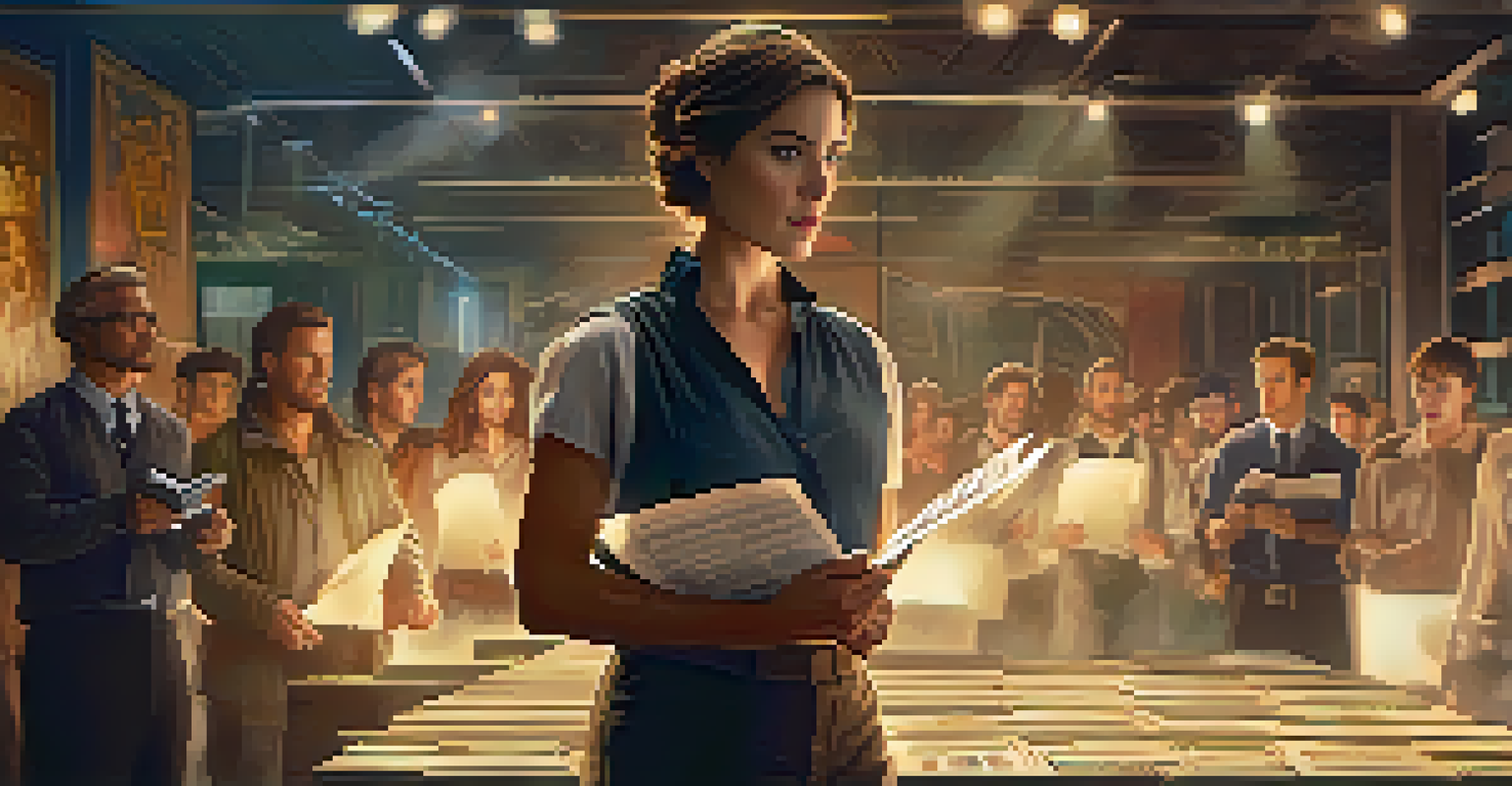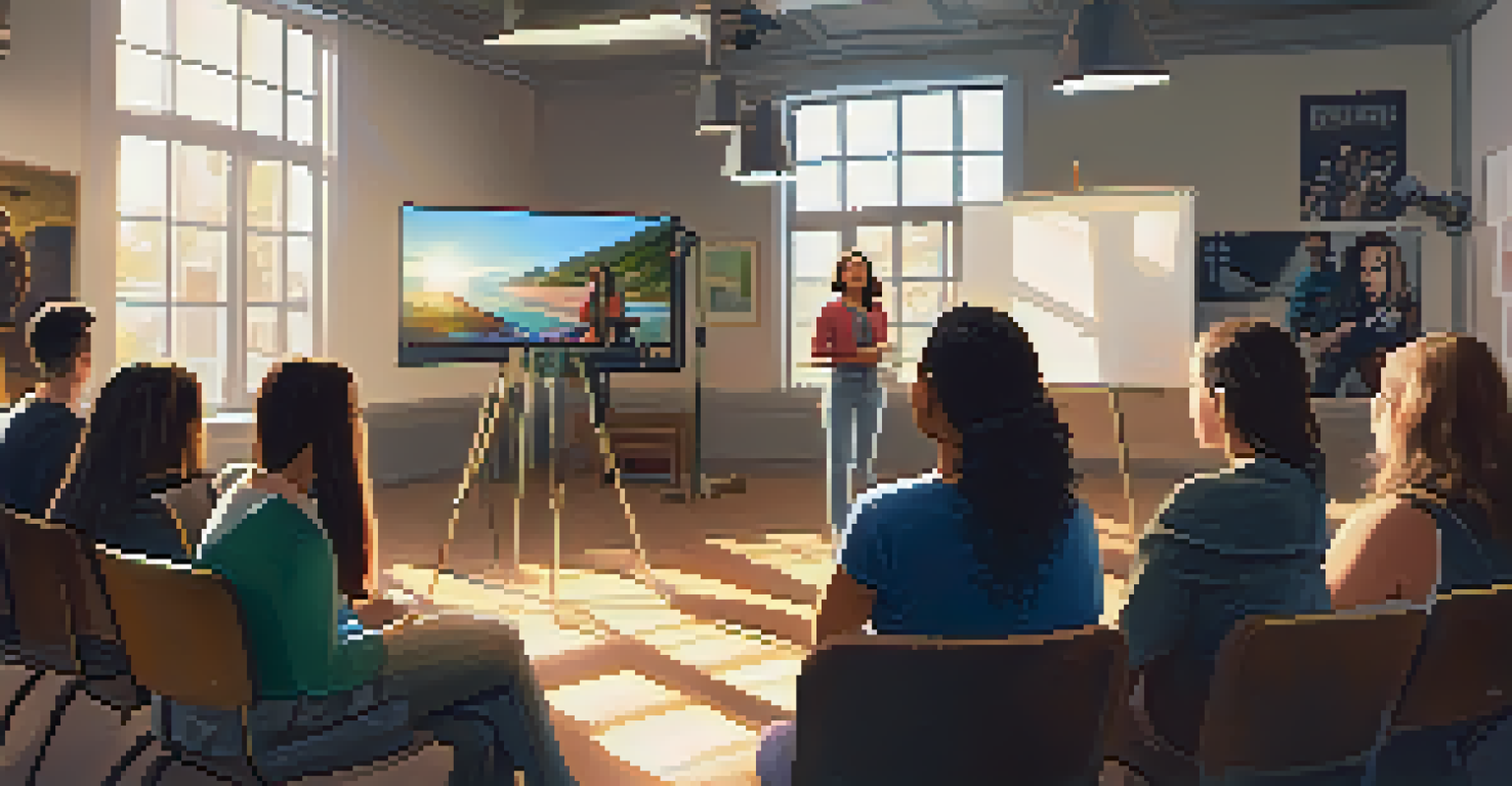Representation Matters: Women in Film Roles

Understanding Representation in Film
Representation in film refers to how different groups of people are depicted. This includes their roles, behaviors, and attributes as seen on screen. It's essential because it shapes societal perceptions and influences how individuals see themselves and their potential.
Films can be a powerful tool for change, and representation matters more than ever.
When women are represented authentically in films, it challenges stereotypes and provides diverse role models. This representation can inspire young girls to pursue careers in various fields, not just limited to traditional roles. A strong female character can resonate with viewers, making them feel seen and understood.
Conversely, a lack of representation can lead to harmful stereotypes and reinforce outdated norms. For example, when women are primarily shown in passive roles, it perpetuates the idea that they are less capable than men. This underscores the need for greater diversity in storytelling to reflect the real world.
The Current Landscape of Women in Film
As of 2023, women are still underrepresented in key film roles, particularly behind the camera. Studies show that female directors and writers are significantly fewer than their male counterparts. This imbalance affects the stories being told and who gets to tell them.

However, there have been encouraging changes in recent years, with more films showcasing strong female leads. Movies like 'Wonder Woman' and 'Little Women' have not only performed well at the box office but have also garnered critical acclaim. Such films demonstrate that audiences are hungry for diverse narratives.
Representation Shapes Perceptions
How women are portrayed in film influences societal views and can inspire future generations.
Despite these advancements, the industry still has a long way to go. It's crucial to continue advocating for equal opportunities and representation in all aspects of filmmaking. The goal is not just to have more women on screen, but to ensure they are portrayed in a variety of roles that reflect their complexity and strength.
Impact of Female Leads on Audience Perception
Female leads in films play a significant role in shaping audience perceptions about gender roles. When women are depicted as complex characters with agency, it challenges societal norms. This shift can lead to greater acceptance and understanding of women's capabilities in real life.
The stories we tell matter. They shape how we see ourselves and our place in the world.
For instance, films like 'Frozen' and 'Moana' highlight strong female protagonists who are not defined by romance but by their adventures and personal growth. These stories encourage young audiences to embrace their individuality and pursue their dreams, regardless of traditional expectations.
Moreover, the success of female-led films at the box office sends a powerful message to Hollywood. It shows that audiences are eager for stories featuring women in diverse roles. This success can pave the way for more inclusive storytelling in the future.
The Role of Film Festivals in Supporting Women
Film festivals have become essential platforms for promoting women's stories and filmmakers. Events like the Sundance Film Festival and the Cannes Film Festival are increasingly showcasing films directed by women. This visibility is crucial for creating opportunities and recognition in the industry.
These festivals often feature panels and discussions focusing on women's contributions to cinema, fostering a sense of community and collaboration. They also provide networking opportunities that can lead to future projects for female filmmakers. It’s a space where stories that might otherwise go untold can gain traction.
Female Leads Drive Change
Successful female-led films challenge traditional norms and demonstrate a market demand for diverse stories.
By highlighting women's work, these festivals help to shift the narrative around female representation in the industry. They challenge the status quo and encourage more equitable practices in filmmaking. As audiences become more aware of these contributions, the demand for diverse voices will only grow.
Challenges Faced by Women in Film
Despite progress, women in the film industry still face numerous challenges. Gender bias, lack of funding, and limited access to key positions remain significant obstacles. These barriers can discourage aspiring female filmmakers from pursuing their dreams.
Additionally, the pressure to conform to traditional expectations can stifle creativity. Women often find themselves navigating a landscape where they must prove their worth constantly. This can lead to a cycle where fewer women are willing to enter the industry or take risks in their storytelling.
Addressing these challenges requires a collective effort from industry leaders and audiences alike. By advocating for mentorship programs and equitable funding, we can create a more inclusive environment. This change will not only benefit women but will enhance the richness of storytelling in film.
The Influence of Social Media on Representation
Social media has revolutionized the way we discuss and advocate for representation in film. Platforms like Twitter and Instagram provide a space for voices often underrepresented in traditional media. They allow audiences to share their opinions and demand better representation.
Movements like #TimesUp and #MeToo have highlighted the need for change within the industry, pushing for accountability and equity. These conversations have led to increased awareness around the importance of female representation. Audiences are now more vocal about their expectations from filmmakers.
Festivals Support Women's Voices
Film festivals play a crucial role in showcasing women's contributions and fostering community within the industry.
Moreover, social media allows female filmmakers to showcase their work independently. They can reach audiences directly and build their own platforms, bypassing traditional gatekeepers. This shift empowers women to tell their stories and connect with viewers, fostering a more inclusive film landscape.
Looking Ahead: The Future of Women in Film
The future of women in film looks promising, with more initiatives aimed at increasing representation. Organizations are actively working to support female filmmakers through grants, mentorship, and networking opportunities. This momentum is crucial for creating lasting change in the industry.
As audiences continue to demand diverse stories, filmmakers are responding by creating content that reflects a wider range of experiences. The success of female-led films signals that there is a market for these narratives. This provides hope that we will see a broader array of stories featuring women in the years to come.

Ultimately, the push for representation is about more than just numbers; it's about authenticity and connection. A diverse film landscape enriches our culture and understanding of one another. By championing women's voices, we contribute to a more inclusive and engaging cinematic future.